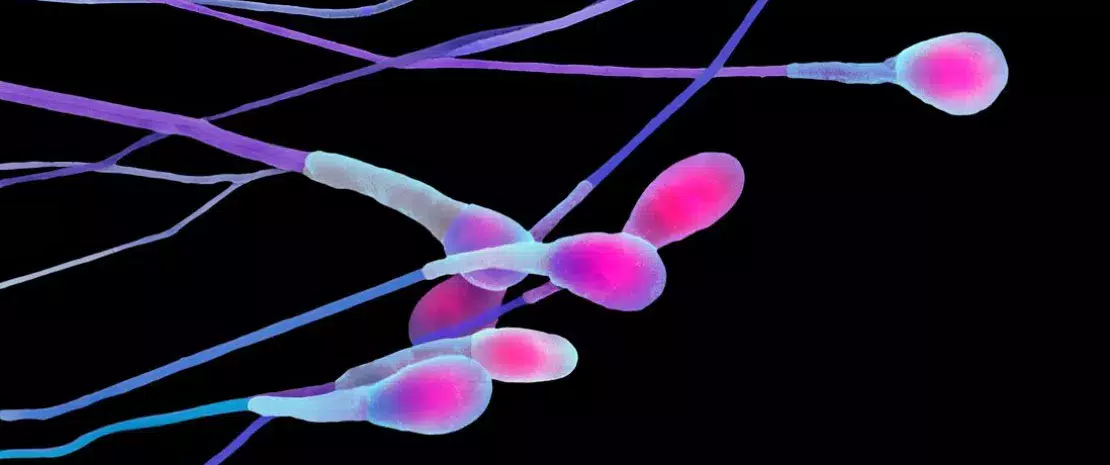Male infertility: is sperm microbiota involved?
In men with abnormal sperm parameters, the sperm microbiota is altered. This suggests that certain microorganisms could influence sperm quality and therefore male fertility.
Lay public section
Find here your dedicated section
Sources
This article is based on scientific information

About this article
Male infertility may be common, but it’s still poorly understood in almost 1 in 3 cases. Could sperm microbiota be involved? Until now, it’s been difficult to find out, as few studies have been dedicated to this microbiota. Even rarer were those approaching the subject from a fertility angle. Hence the interest generated by the work of an American team: according to them, a small group of microorganisms could contribute to reduced fertility in men. 1
Key figures on infertility
1 in 6 people suffer from infertility during their lifetime. 2
50-60%: significant drop in sperm count between 1973 and 2011 among men in North America, Europe, Australia and New Zealand. 3
30-50% of explained cases of infertility are linked to men. 4
Fertility, sperm and microbiota
73 men undergoing fertility evaluation or requesting vasectomy after one or more children were divided into groups according to the results of analysis of their sperm quality. The first finding of the study: sperm abnormalities (sperm concentration, sperm motility) do not necessarily reflect fertility or subfertility. The group with a normal spermiogram included 40% of the men being evaluated for hypofertility. The second finding: contrary to the results of other studies (different populations? methodology?), the researchers did not observe any significant change in the (sidenote: Alpha diversity Number of species coexisting in a given environment ) or (sidenote: Beta diversity Rate of variation in species composition, calculated by comparing the number of unique taxa in each ecosystem ) diversity of the microbiota between normal and non-normal sperm. So, according to the authors, it may not be a global dysbiosis that contributes to subfertility, but a more subtle change in certain species.
Bacteria associated with sperm abnormalities
Overall, Enterococcus faecalis, Staphylococcus epidermidis, Corynebacterium tuberculostearicum and Lactobacillus iners are the most abundant bacteria in semen. But there are subtle differences between anomalies. Sperm with poor motility were richer in Lactobacillus iners (9.4% vs. 2.6%). Similarly, semen samples with a low sperm count were richer in Pseudomonas stutzeri (2.1% vs 1.0%) and P. fluorescens (0.9% vs 0.7%), but had a lower abundance of P. putida (0.5% vs 0.8%).
While this observational study provides only correlations, and by no means causal relationships, its results suggest that some bacteria may play a role in the disturbance of sperm parameters. Especially since L. iners, a pro-inflammatory agent, is also implicated in reduced fertility in women undergoing medically assisted procreation (MAP). This study is therefore the first of its kind to demonstrate a relationship between the presence of L. iners and male infertility.
Far from providing a definitive conclusion, the results of this single-center observational study should be used as input for future studies (mechanistic, longitudinal and multi-center). This might not only lead to a better understanding of sperm microbiota, but also to potential therapeutic options for improving male fertility.
Recommended by our community

"Interesting!" -@Amasvingwe (From Biocodex Microbiota Institute on X)
1. Osadchiy V, Belarmino A, Kianian R et al. Semen microbiota are dramatically altered in men with abnormal sperm parameters. Sci Rep. 2024 Jan 11;14(1):1068.
2. https://www.who.int/health-topics/infertility
3. Levine H, Jørgensen N, Martino-Andrade A et al. Temporal trends in sperm count: a systematic review and meta-regression analysis. Hum Reprod Update. 2017 Nov 1;23(6):646-659. doi: 10.1093/humupd/dmx022.
4. Eisenberg ML, Esteves SC, Lamb DJ et al. Nat Rev Dis Primers. 2023 Sep 14;9(1):49.










